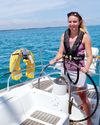
Rope is used to rotate nearly all furling drums and some – such as Code 0 sail furlers and the old Hood in-mast system – employ a continuous line.
On my brigantine schooner Britannia, the French-made Facnor furling drivers on the mainsail and fore-course squaresail are operated by long ropes that pass once around the rotating drum and out the other side, then back to the cockpit.
They use a 3/8in (10mm), double-braided line to grip the driver, much like the jaws on a self-tailing winch, which in turn rotates the mandrel (foil) to wind the sails in and out.
My mainsail needs 16 rotations of the driver and the squaresail needs 19. Using a single line therefore results in a very long tail on one end or the other, whether the sails are furled or unfurled; the squaresail tail is 45ft long and the mainsail 35ft. These lines all lead back to the cockpit and, with the addition of two headsails and between-mast staysail furling lines, it can become very cluttered.
It would be a great improvement if these long lines could be made into a continuous loop, with only a few feet in the cockpit to go round the winches. Then I could just wind away, without having to coil yards of rope to keep the area tidy.
Considerations
There are different methods to make a continuous (or end-to-end) loop with double braided line, described in rope-maker manuals and web videos, but they result in a splice that is thicker than the rest of the rope, and may not pass around the jaws of drum drivers or through clutches, blocks and self-tailing winches, with serious possibilities of a rope jam. Therefore any continuous splice needs to be no thicker than the rest of the rope. Needless to say, the splice also has to be very strong.
この記事は Practical Boat Owner の October 2021 版に掲載されています。
7 日間の Magzter GOLD 無料トライアルを開始して、何千もの厳選されたプレミアム ストーリー、9,000 以上の雑誌や新聞にアクセスしてください。
すでに購読者です ? サインイン
この記事は Practical Boat Owner の October 2021 版に掲載されています。
7 日間の Magzter GOLD 無料トライアルを開始して、何千もの厳選されたプレミアム ストーリー、9,000 以上の雑誌や新聞にアクセスしてください。
すでに購読者です? サインイン

Orca sink yacht in Strait of Gibraltar
Spain's maritime rescue service, Salvamento Maritimo, has reported that a 15m (49ft) yacht sank in Moroccan waters in the Strait of Gibraltar following interaction with a pod of orca.

No kill cord or lifejackets were worn during fatal powerboat crash
A kill cord and lifejacket are useless unless worn-that's the warning from the Marine Accident Investigation Branch (MAIB), following its investigation into a powerboat crash that killed a 32-year-old woman and five-year-old girl on 2 October 2022.

Multihull sail work
Brush up on multihull sailing skills before heading off on charter with Gavin Le Sueur's guide to spinnaker handling, tacking and gybing

Five top causes of engine failure and how to prevent them
Jake Kavanagh talks to Sea Start marine engineer Nick Eales about how to avoid the five major causes of an engine breakdown at sea

Sail the Atlantic with strangers
Would you sail across the Atlantic with someone you've just met? Ali Wood meets the cruising crews who've done just that

IZIBoat: simple sailing
Rupert Holmes sails an innovative catamaran design intended to widen participation in sailing among those with little time to get on the water in more conventional craft

30 WAYS TO GET AFLOAT
From tall ships to small dinghies, you needn't own a boat to sail. Ali Wood looks at the options, and how skippers can also find crew

Boats for restoring under £20,000
Duncan Kent picks the best sub-35ft sail and power boats to look for when aiming to undertake a restoration on a budget

Seaworthy dinghies for less than £500
For low cost traditionally-styled GRP trailer-sailers, consider the Foreland and the Otter available at bargain basement prices

Playing with coloured sails
Maintaining an hourglass-shaped balloon and ratcheting up the log numbers